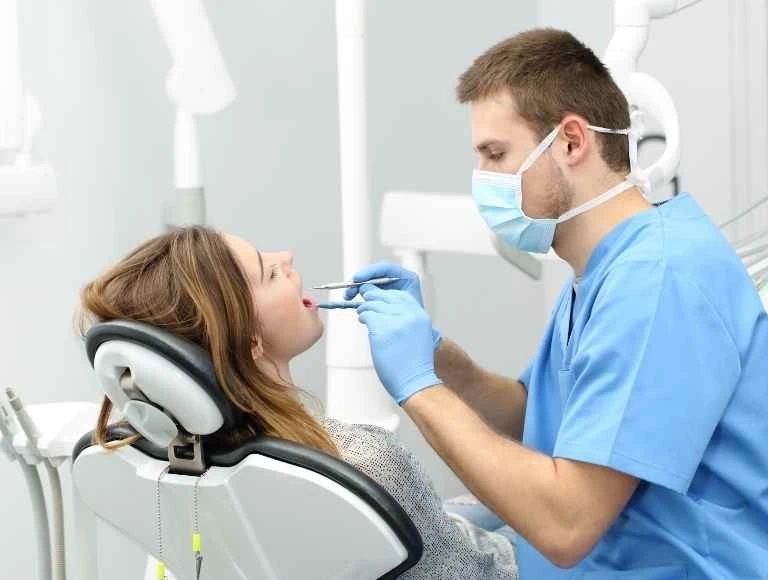Accidental or sports-related injuries can result in traumatic dental damage. Most of these wounds are minor, like chipped teeth. Though less frequent, losing a tooth or having one knocked out are more severe injuries. Each injury\'s kind, location, and severity affect the treatment course.
Every day, different sports-related injuries occur. They cause dental emergencies and may have long-lasting, detrimental effects on oral and general health. Even if you suffer a blow to the mouth, knowing the facts about frequent sports-related dental injuries, how to avoid them, and what to do if they occur will help you maintain your oral health.
Damaged Roots
- One possible outcome is a fractured root, which starts at the root level and moves up to the tooth\'s visible surface if a tooth receives a blow at a specific angle.
- These fractures are sometimes undetectable and might not be discovered until an infection takes hold. The location of the fracture along the root will determine how severe the tooth injury will be.
- The sooner you visit your dentist for root canal therapy to stop an infection from spreading to the tooth pulp if you have a fractured tooth root, the less probable it is that you will experience necrosis and lose the tooth.
Broken Teeth
- Even though your natural teeth are sturdy, they could shatter or fracture if you experience a blow to the face while playing sports.
- Although little splits or cracks in a tooth\'s enamel may not be dangerous to your oral health, a cracked tooth is one where the break or damage begins at the tooth\'s crown and extends downward.
- Sharp discomfort while biting down and intermittent toothache are possible symptoms, albeit they are not usually present.
- The tooth\'s inner layers may become exposed if a portion of the outer enamel shell is destroyed.
- Some cracks may compromise the cusp and extend past the gumline, necessitating a root canal or tooth extraction to prevent bacterial infection.
Tooth Intrusion
- Some wounds may cause teeth to re-engage with the jawbone. Dental trauma of this kind is referred to as an incursion.
- Although this injury is more common in children\'s teeth, it may happen to players of all ages.
- The tooth pulp may be destroyed, killed, or sustain permanent damage due to this injury. Along with ankylosis, root resorption is another possibility.
Your emergency dentist must deal with a dental emergency as soon as possible. Most of us will experience an emergency dental situation at some point in our lives, whether it be a severe toothache, a chipped tooth, a sports injury, or something else.
Follow these steps to manage discomfort before visiting the dental emergency :
- Use warm water to swish your tongue around.
- Until any bleeding stops, press the area with gauze.
- Apply an ice pack to the lips or cheeks to relieve pain and swelling.
- Consider taking an over-the-counter painkiller.
Painful toothache
There may be severe pain with severe toothaches, which can happen suddenly or gradually. You have a dental emergency if you have a painful toothache that is not relieved by over-the-counter pain relievers.
Between the Teeth Object
Typically, dental floss is the best tool for removing objects from between your teeth, but if this does not work, your dentist must remove the thing. Avoid moving it with a sharp instrument, as you can hurt your gums or push it deeper between your teeth.
Knocked Out Teeth
Your tooth may be possible to be repaired by your dentist after it has been knocked out. Try to find your tooth, clean it with water, and replace it in the socket. Hold it in your cheek or put it in a milk container if you cannot insert it into the socket.
Lost fillings or crowns
The tooth\'s structure could be compromised if you lose a crown or filling since the tooth\'s interior will be exposed. Additionally, it can be excruciating and sensitive. A lost filling is, therefore, a dental emergency.
Chipped or broken teeth
In many instances, teeth that have been chipped or fractured can be preserved. A filling usually fixes a tiny fracture, and a crown or root canal can fix more extensive fractures.
Lip or tongue lacerations
A dental emergency exists if an injury to the inside of your mouth causes a laceration on your lip or tongue. Use a clean cloth to clean up to stop bleeding. Apply an ice pack to the region if swelling, and get help immediately.
Final Thoughts
Reattaching the shattered tooth fragment usually suffices to fixing fractured teeth. Alternatively, the dentist may choose to repair the damage with bonding, a filling that matches the surrounding teeth, or a crown. However, understanding how to respond and what actions to take to lessen discomfort and save your tooth may help you maintain your composure if a dental injury occurs.



